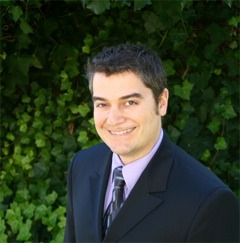How to Get a Copyright for a Nonfiction Book in 4 Easy Steps

If you want to learn how to get a copyright for your nonfiction book, follow the four simple steps in this article for peace of mind.
Registering your book’s copyright with the U.S. Copyright Office is the safest way to defend your copyright ownership in a court of law, especially if you want to sue a person or an entity for infringement.
Although copyright is automatically assigned to the owner of a creative work by the mere act of creation, in the U.S. you can’t sue for infringement in a court of law unless you have a copyright certificate from the U.S. Copyright Office to prove your authorship.
The registration costs are very reasonable and the process quite straight forward, although if you want to make sure that your application is error free, you can always enlist the help of a copyright attorney to file the application on your behalf.
Step 1: Determine Your Eligibility
The eligibility for copyrighting your nonfiction book is quite easy to meet. To be eligible, you need to be:
- The legitimate author of your book. In other words, you have either written the book yourself or you hired a professional writer or a ghostwriter to do it on your behalf. If you used the latter, make sure that your agreement stipulates clearly that your book is a work for hire and that you’re the sole owner of the book’s copyright.
- Your book must be in a “fixed” medium of expression (such as a digital file or a printed manuscript).
It’s as simple as that. Now, just in case your copyright goes into litigation at any point in the future, make sure that you keep all the evidence of your authorship, such as notes, mind maps, any charts, research, draft manuscripts, computer files, email communications, etc.
In short, don’t throw anything away when you’re done, don’t recycle any paper with information about your book and keep backups of all book-related files on a USB stick.
Step 2: Add a Copyright Page to Your Book
Next, add a copyright page on the back of your title page in the front matter of your book. This page must include:
- A copyright notification (e.g. Copyright © <year> by <copyright owner, e.g. your name, your company name, etc.>).
- Your publisher’s name and address. If you are self-publishing, then you can create a publisher imprint, or use your business as the publisher. If you don’t want to include a physical street address, you can use a P.O. Box instead.
- Your book’s edition followed by the date of publication – Month and year will suffice (e.g. First Edition, September 2019).
- The book’s print run if applicable (e.g. first printing, second printing, etc.).
- A statement of rights (e.g. “All rights reserved. No part of this publication may be reproduced or transmitted in any form or by any means, electronic or mechanical, including photocopying, recording, scanning or otherwise, or through any information browsing, storage or retrieval system, without permission in writing from the publisher.”)
- Your book’s Library of Congress Cataloguing-in-Publication data. To request this information as a self-published author, visit: https://locexternal.service-now.com/auth.
- Permissions from other copyrighted works, if applicable (e.g. if you’re quoting a poem from another author in your book, you must first obtain their permission in writing and post it on this page).
- Legal disclaimers, if applicable. You’ll need to consult with an attorney to obtain the appropriate text for your nonfiction book, especially if it’s a legal requirement by a government agency (e.g. if you offer investment advice, the SEC may require that you show one or more disclaimers).
Step 3: File to Register Your Copyright
Now it’s time to file your application for copyright registration with the U.S. copyright office. The process is quite simple and it can be done online by visiting www.copyright.gov or by mailing Form TX (downloadable from the same website).
To learn about the different fees that apply to copyright registrations, read this article: What’s the Copyright Cost for a Nonfiction Book?
To learn the steps to follow to register your book online, read this article: How to Copyright a Book: A Guide for Nonfiction Authors.
Step 4: Mail Your Book to The U.S. Copyright Office
Once you’ve completed your registration, you’ll need to mail two copies of your book to fulfill the U.S. Library of Congress mandatory deposit requirement to:
Library of Congress
Copyright Office
Attn: 407 Deposits
101 Independence Avenue SE
Washington, DC 20559-6600
Next Steps
If you want to make 100% sure there are no filing errors that could compromise your claim to copyright ownership in the future, it’s better to consult with a copyright attorney prior to filing – they could either check your form or complete it and file it on your behalf.
You’ve worked so hard to create your nonfiction book, and a formal registration with the U.S. Copyright office will guarantee that your authorship is never brought into question.
If you enjoyed this article and are in the process of self-publishing a nonfiction book, be sure to check out my free nonfiction success guide, drawn from years of experience editing books for bestselling authors (including a New York Times bestseller) and ghostwriting for CEOs and politicians. Simply click here to get instant access.
Ben
Leave me a comment below if you have any questions or a specific need that I can help you address – I operate an author services firm that specializes in helping entrepreneurs, professionals and business owners who want to publish books as a calling card for prospects, to establish their status as an expert or to just to generate additional leads for their businesses.
Here are some related posts I highly recommend:
How to Grow Your Business Writing a Nonfiction Book
Write Your Own Book and Become an Expert: 11 Reasons Why You Should

Bennett R. Coles is an award-winning author of six books published through Harper Collins (New York) and Titan Publishing Group (London). He is also the publisher at Promontory Press, editor for multiple bestselling authors (including a NY Times bestseller), ghostwriter for CEOs and politicians and the founder of Cascadia Author Services, a boutique full-service firm that specializes in premium author services specifically designed for busy professionals. Our end-to-end services include writer coaching, ghostwriting, editing, proofing, cover design, book layout, eBook production, marketing, printing and distribution.







Leave a Reply